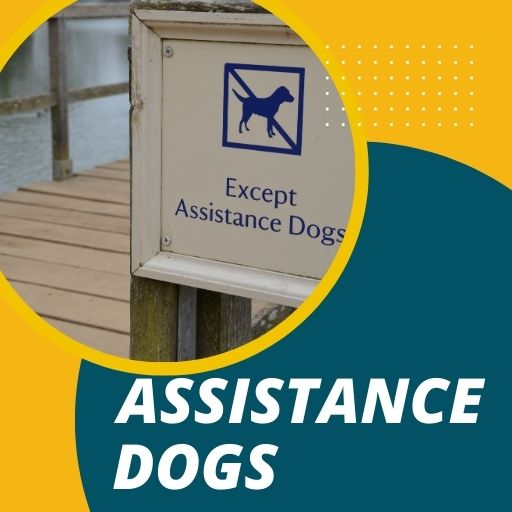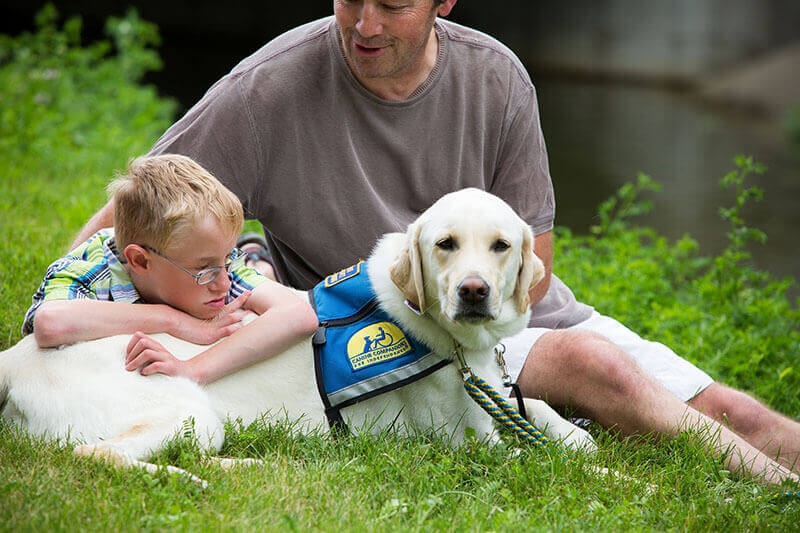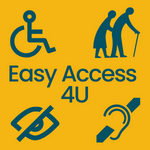A comprehensive guide to assistance dogs
If you provide a service to members of the general public whether
for payment or not, whether you are a private company
or a public service, this guide is for you.
It clarifies what your lawful obligations and legal duties are to assistance dog owners under the Equality Act 2010 as well as how you can fulfill them, typically at no extra cost to your business.
There is so much confusion within the hospitality sector with regard to assistance dogs and confrontation can occur due to staff and business owners not fully understanding their obligations whilst the customer is within their premises.

What is an assistance dog?
Thousands of disabled people rely on an assistance dog to help them with day to day activities that many people take for granted. You may be surprised to learn that it’s not only blind people that are helped by assistance dogs.
Assistance dogs are also trained to help people with hearing difficulties, epilepsy, diabetes, physical mobility problems and more. Assistance dogs carry out a variety of practical tasks for people as well as supporting their independence and confidence.
Assistance dogs are not pets and are treated as ‘auxiliary aids’
Assistance dogs are highly trained which means they:
• will not wander freely around the premises
• will sit or lie quietly on the floor next to their owner
• are unlikely to foul in a public place
Most are instantly recognisable by a harness or jacket.
However, the law does not require the dog to wear a harness or jacket to identify it as an assistance dog. Some, but not all assistance dog users, will carry an ID book giving information about the assistance dog and the training organisation together with other useful information.
Again, this is not a legal requirement and assistance dog users should not be refused a service simply because they do not possess an ID book.
Assistance dogs can also be owner trained and the owner selects their own dog to fit their own requirements.
Why should assistance dogs be welcomed by businesses?

Disabled people who use assistance dogs quite often experience discrimination that prevents them from doing everyday things other people take for granted.
This is because shops, restaurants and other businesses sometimes object to assistance dogs being brought onto their premises. If this happens, the effect is to deny the disabled person the opportunity to buy goods or use services in the way other people do.
Potential consequences include losing valuable business and risking claims of disability discrimination, which could result in financial compensation.
What are my legal obligations?
A disability is defined by the Equality Act 2010 as ‘a physical or mental impairment which has a substantial and long-term adverse effect on the ability to carry out normal day-to-day activities’.
It is unlawful for a service provider to discriminate against a disabled person in the following ways:
Direct discrimination: treating a person less favourably than others because they are disabled or perceived to be disabled.
For example, refusing to allow entry to disabled customers, whether or not they have assistance dogs.
Indirect discrimination: where a particular policy has a worse impact on disabled people than on people who are not disabled. For example, a ‘no dogs’ policy will have a worse impact on disabled people using assistance dogs and could be indirect discrimination unless the policy can be objectively justified.
Discrimination arising from disability: treating someone unfavourably because of something connected to their disability.
For example, refusing the same level of service to a disabled person because they have an assistance dog.
Failure to make reasonable adjustments: where a physical feature, provision or practice puts a disabled person at a substantial disadvantage the service provider has a duty to take reasonable steps to avoid that disadvantage.
For example, it will often be reasonable to disapply a ‘no dogs’ policy for assistance dog owners and a failure to do so would amount to unlawful discrimination
Disability harassment: treating someone in a way which makes them feel humiliated, offended or degraded for reasons related to their disability.
Direct discrimination by association: treating a person who may or may not be disabled less favourably because of their association with a disabled person.
Victimisation: treating a person who may or may not be disabled badly because they have made a complaint of discrimination or supported someone who has made a complaint.
Discriminatory advertisements: if a service provider advertises that in providing a service they will treat disabled people unfavourably this will amount to discrimination. For example, stating in a brochure that assistance dogs are not welcome on the premises.
Positive discrimination: the law recognises the particular disadvantages that disabled people face and so treating disabled people more favourably than others is permitted.
It would be unlawful to refuse a service to a disabled person accompanied by an assistance dog except in the most exceptional circumstances.
Ultimately only a court can determine whether a refusal of service is unlawful and such a determination would be highly dependent on the specific facts and circumstances of the particular case.

Frequently Asked Questions From Business Owners
How can I tell it is an assistance dog and not just a pet? Assistance dogs are highly trained to the owner’s requirements and:
- will not wander freely around the premises
- will sit or lie quietly on the floor next to its owner.
If you have a lot of customer-facing staff, consider displaying a small sign or sticker on the door or wall at the entrances showing that assistance dogs are welcome. Make sure all relevant staff are made aware that they must allow access to assistance dogs.
What if the dog fouls on my premises? Assistance dogs are highly trained and so are very unlikely to foul in a public place.
My business sells food products, am I obliged to allow assistance dogs in? Assistance dogs are highly trained, have regular veterinary treatments and are tested on a regular basis to make sure they don’t present a health risk. The Chartered Institute of Environmental Health has determined that they are unlikely to present a risk to hygiene and should be allowed access to restaurants, cafes, hotels, food shops and other food premises.
What if the assistance dog is a danger or nuisance to other customers or staff? Assistance dogs are highly trained to make sure they are always under control and will not be a nuisance to anyone. For example, they will not jump up and will lie down at their owner’s feet if the owner sits down to eat. Disabled people who are partnered with assistance dogs may also receive expert training to ensure that they can handle their dogs.
Why should I allow a disabled person to be accompanied by their assistance dog? Disabled people rely on their assistance dogs to assist them with everyday tasks and would find it hard to manage without them. It would be unlawful to refuse access to a disabled person accompanied by an assistance dog except in the most exceptional circumstances (for example, in certain hospital wards).
Assistance dogs as well as being trained to carry out tasks can also provide emotional and psychological wellbeing and improve the confidence of disabled people who use them.
Are there cultural or religious reasons to deny service to a person with an assistance dog? Religious or cultural beliefs have sometimes been cited as a reason for non-admittance of assistance dogs. However, service providers should permit access to assistance dogs and such beliefs are not a defence against non-compliance. However, this is a sensitive aspect of the access issue and tact should be used by all involved. The Muslim Shariat Council have clarified that Muslims should accept assistance dogs in their businesses.
What if someone is or might be allergic to dogs? Refusing to allow access to people with assistance dogs because other people ‘might’ be allergic to dogs is likely to be unlawful disability discrimination. This is because the Equality Act 2010 states that service providers must make reasonable adjustments to policies for disabled people. This includes amending ‘no dogs’ and ‘no pets’ policies to allow access for assistance dogs.
If there is an identifiable person with an allergy to dogs then employers and service providers should take reasonable steps to ensure that person has minimal or no contact with dogs; reasonable steps are unlikely to include banning all assistance dogs.

This guide to assistance dogs has been provided by the The Equality and Human Rights Commission who have a statutory remit to promote and monitor human rights;and to protect, enforce and promote equality.
You can download the guide and keep for future reference by clicking here
